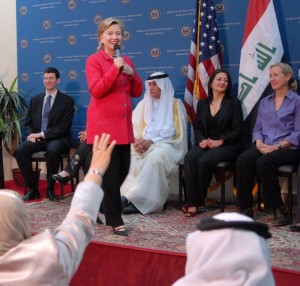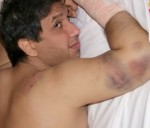Wednesday
Feb172010
Iran Analysis: Ahmadinejad Stumbles; "Karroubi Wave" Surges
 Wednesday, February 17, 2010 at 10:26
Wednesday, February 17, 2010 at 10:26
A  curious and possibly important Tuesday. It did not promise drama at the start of the day: the Iran stories were mainly of significant but behind-the-headlines sparring on the economic front, while the Western press were distracted by the chest-puffing of US Secretary of State Hillary Clinton and Foreign Minister Manouchehr Mottaki over "dictatorship" and the nuclear issue.
curious and possibly important Tuesday. It did not promise drama at the start of the day: the Iran stories were mainly of significant but behind-the-headlines sparring on the economic front, while the Western press were distracted by the chest-puffing of US Secretary of State Hillary Clinton and Foreign Minister Manouchehr Mottaki over "dictatorship" and the nuclear issue.
But then came a series of developments, punctuated by two events: the press conference of the President and the "Karroubi wave".
EA had the chance to live-blog the Ahmadinejad 2-hour show and it proved a revelation. The President was trying to use this occasion to re-assert his authority after his claimed success of "tens of millions" at the pro-Government 22 Bahman rally, putting out his double line on uranium enrichment --- "we can be self-sufficient, but we will also negotiate" --- plus standard rhetoric of Iran's strength and Western weakness.
But the President's plan unravelled as he was challenged time and again on his economic plans --- because of the opposition within the establishment to the budget and subsidy proposals, not to mention concern over the state of Iran's economy, there is plenty of space for journalists to press the topic. And there were even queries over the realities of 22 Bahman and the post-election detentions. (Credit to the brave reporters who brought up the issue. Take note: pro-regime mouthpieces might deny there is any problem, but almost all Iranian journalists will do their jobs with the knowledge that colleagues are in jail and sometimes serving lengthy sentences.)
Then, only five days after 22 Bahman, there was the clearest sign that this conflict isn't over. A new "Karroubi wave" of opposition has surged. Mehdi Karroubi signalled this weekend that he would soon be meeting with Mir Hossein Mousavi to discuss next steps, but in one sense they are already occurring.
While the cleric stands back for the moment, his wife Fatemeh and son Hossein --- using the detention and beating of Karroubi's younger son Ali but going far beyond it --- have pushed the core issues of the detentions, abuses, and injustices now undermining the values and stability of the Islamic Republic. Most importantly, the Karroubis are now doing so in a direct challenge to the Supreme Leader: none of them bother to mention Ahmadinejad and they explicitly dismiss Iran's judiciary as impotent.
Of course, there is a long way to go with this strategy. One will have to watch for the reaction of other Green factions to the challenge, and it is not clear if the high profile given to Karroubi outside Iran is matched inside the country. That said, it has been Karroubi's interventions --- his open letter at the end of July first raising the detainee abuse issue, his appearances at rallies such as Qods Day and at public events such as the Tehran Fair, his recent declaration on "Mr Khamenei" and a "selected rather than elected" President --- that have contributed to surges in protest.
The regime may have thought they had finally blunted Karroubi when they turned him back on 22 Bahman, tear-gassing his entourage and detaining and beating his son. In fact, the statements of Fatemeh and Hossein Karroubi point to the opposite effect. The attack on Ali Karroubi --- whether it was carried out by security forces or "rogue" units, whether it was sanctioned by the Supreme Leader or occurred without his knowledge --- has offered a new platform for the wider campaign. And this time, the Karroubis are not bothering with the President or his officials; they are going straight to the top with the presentation to Ayatollah Khamenei of the issues.
Neither of these developments is likely to see the light of day in Western media coverage. CNN, for example, cannot see beyond "Iranian president warns against tougher sanctions" and "Iran official (Mohammad Javad Larijani): Clinton 'inconsistent'". The New York Times misses the stories entirely, featuring instead yet another weak analysis of Washington's policy on Iran.
But I think shrewd Iran observers would be wise to keep eyes on the economic situation and the resurgence of a Karroubi-supported opposition. EA is not in the habit of making predictions, but if we're right about yesterday, this conflict ain't over.
 curious and possibly important Tuesday. It did not promise drama at the start of the day: the Iran stories were mainly of significant but behind-the-headlines sparring on the economic front, while the Western press were distracted by the chest-puffing of US Secretary of State Hillary Clinton and Foreign Minister Manouchehr Mottaki over "dictatorship" and the nuclear issue.
curious and possibly important Tuesday. It did not promise drama at the start of the day: the Iran stories were mainly of significant but behind-the-headlines sparring on the economic front, while the Western press were distracted by the chest-puffing of US Secretary of State Hillary Clinton and Foreign Minister Manouchehr Mottaki over "dictatorship" and the nuclear issue.But then came a series of developments, punctuated by two events: the press conference of the President and the "Karroubi wave".
Iran Document: Fatemeh Karroubi “My Family Will Continue to Stand for the People’s Rights”
Iran: Why The Beating of Mehdi Karroubi’s Son Matters
The Latest from Iran (17 February): Psst, Want to See Something Important?
EA had the chance to live-blog the Ahmadinejad 2-hour show and it proved a revelation. The President was trying to use this occasion to re-assert his authority after his claimed success of "tens of millions" at the pro-Government 22 Bahman rally, putting out his double line on uranium enrichment --- "we can be self-sufficient, but we will also negotiate" --- plus standard rhetoric of Iran's strength and Western weakness.
But the President's plan unravelled as he was challenged time and again on his economic plans --- because of the opposition within the establishment to the budget and subsidy proposals, not to mention concern over the state of Iran's economy, there is plenty of space for journalists to press the topic. And there were even queries over the realities of 22 Bahman and the post-election detentions. (Credit to the brave reporters who brought up the issue. Take note: pro-regime mouthpieces might deny there is any problem, but almost all Iranian journalists will do their jobs with the knowledge that colleagues are in jail and sometimes serving lengthy sentences.)
Then, only five days after 22 Bahman, there was the clearest sign that this conflict isn't over. A new "Karroubi wave" of opposition has surged. Mehdi Karroubi signalled this weekend that he would soon be meeting with Mir Hossein Mousavi to discuss next steps, but in one sense they are already occurring.
While the cleric stands back for the moment, his wife Fatemeh and son Hossein --- using the detention and beating of Karroubi's younger son Ali but going far beyond it --- have pushed the core issues of the detentions, abuses, and injustices now undermining the values and stability of the Islamic Republic. Most importantly, the Karroubis are now doing so in a direct challenge to the Supreme Leader: none of them bother to mention Ahmadinejad and they explicitly dismiss Iran's judiciary as impotent.
Of course, there is a long way to go with this strategy. One will have to watch for the reaction of other Green factions to the challenge, and it is not clear if the high profile given to Karroubi outside Iran is matched inside the country. That said, it has been Karroubi's interventions --- his open letter at the end of July first raising the detainee abuse issue, his appearances at rallies such as Qods Day and at public events such as the Tehran Fair, his recent declaration on "Mr Khamenei" and a "selected rather than elected" President --- that have contributed to surges in protest.
The regime may have thought they had finally blunted Karroubi when they turned him back on 22 Bahman, tear-gassing his entourage and detaining and beating his son. In fact, the statements of Fatemeh and Hossein Karroubi point to the opposite effect. The attack on Ali Karroubi --- whether it was carried out by security forces or "rogue" units, whether it was sanctioned by the Supreme Leader or occurred without his knowledge --- has offered a new platform for the wider campaign. And this time, the Karroubis are not bothering with the President or his officials; they are going straight to the top with the presentation to Ayatollah Khamenei of the issues.
Neither of these developments is likely to see the light of day in Western media coverage. CNN, for example, cannot see beyond "Iranian president warns against tougher sanctions" and "Iran official (Mohammad Javad Larijani): Clinton 'inconsistent'". The New York Times misses the stories entirely, featuring instead yet another weak analysis of Washington's policy on Iran.
But I think shrewd Iran observers would be wise to keep eyes on the economic situation and the resurgence of a Karroubi-supported opposition. EA is not in the habit of making predictions, but if we're right about yesterday, this conflict ain't over.




